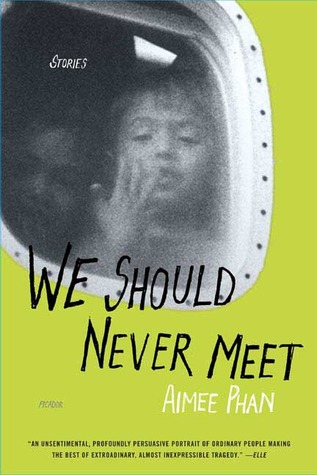The novel for this week, We Should Never Meet by Aimee Phan, was a tough one to read. The eight stories, all told through varying timelines of the Vietnam War, linked together to show the heartbreaking results of battle torn country like Vietnam. There seemed to be many themes throughout the stories, from bringing shame upon a family, to resentment built up over years, to family, othering, racism, sexism, and many others.
The first story, Miss Lien, really balances many of this big themes; after Lien gets sent by her family to go make money in Saigon. Lien feels it is her duty as the oldest child to bring her family out of their war-caused poverty, but she ends up pregnant with a bui-doi baby and unable to do anything but give the baby up. Lien feels deep shame for letting this happen to her, feeling it to be her own fault, and we see a glimpse into the rape culture of the Vietnam War where many young Vietnamese women were impregnated by American GI’s, willingly or not, and then left to care for a child they did not ask for. Lien becomes one of these poor women, with a baby she cannot care for and leaves it with little to no emotion abandoned on the steps of an orphanage, which we later get a look into.
Not only do we get to see what the inside of the overcrowded orphanages were like but also what those bui-doi children ended up being like after Operation Babylift. I honestly did not know much about the Vietnam War, except for what I’ve seen from history books and from movies about it so I really had no clue about Operation Babylift or what the war was like for the Vietnamese people. This book gave me a lot of insight into what it might have been like to be a Vietnamese refugee during such tumultuous times as well as what it might have been like being raised as a Vietnamese-American orphan in the United States.
In a couple of the stories, they are focused on three of the Operation Babylift children who were affected by that government mandate in different ways: Kim, who was part of the Operation but went on to bounce between foster homes in California; Mai, who was evacuated two years after Babylift and knew her mother, was taken in but not adopted by an American couple and had her future set for her; and Huan, the half black, half Vietnamese boy who was also part of the Operation at the same time as Kim and was the only one of the three to be adopted by an American family. There was a strong family dynamic between Kim and Mai, who were foster sisters for many of their primary years until Mai was taken to her semi-permanent house and parents. Kim is two years older than Mai and their relationship reflects that of an older and younger sister, especially with the Vietnamese influence of Kim being the elder and therefore the one to be obeyed and listened to. Their relationship struggles, though, because not only are they not biological sisters but they begin to lead very different Americanized lives from each other. The novel explores a lot of those politics that make up a Vietnamese family, from the biological relationships like in Lien’s family, to Mai and Kim’s chosen sisterhood.
One of the most interesting part of the novel was the story Visitors, where we see Vinh’s character cross into the picture. I felt like this story gave a lot deeper look into who Vinh is and the anger he holds against the US for taking him from his country. Vinh prides himself on being Vietnamese but he doesn’t seem to care about any traditions or cultural norms with being Vietnamese like respecting your elders — Vinh continuously targets and attacks other Vietnamese American families because he thinks lowly of them for being Americanized. But Vinh is just as Americanized as they are, if not more because of his ties to American culture like his car, being in a gang, and wanting the latest American technology. Vinh’s blame against the Americans seems misplaced considering he doesn’t seem to know as much as he thinks he does; as he talks with Bac Nguyen, Bac blames only the Viet Cong for destroying his young life in Vietnam, subjecting him to prison camps and losing his family. Vinh has a lot of big talk about hating the Americans and this idea of living the American Dream, but he is buying into it just as much as anyone else by ignoring his cultural roots and being so Americanized all the while profiting off hurting his fellow Vietnamese Americans. The next story, Gates of Saigon, shows a stark contrast between Vinh’s opinion of the Americans in the Vietnam War when he has no real firsthand experience or knowledge of it, compared to Hoa’s understanding view of the American help in the same war that she was present for.
All of these stories seem to show the many faceted sides of the war and how it affected all different types of people, American or Vietnamese. The novel really seemed to center around the Vietnamese people who wanted to help the Amerasian babies get out safely and then following the stories of a few of those escaped children in their lives as American citizens. It showed that the war did not come without hardships from all sides and that people suffered in more ways than just on the battlefield.
